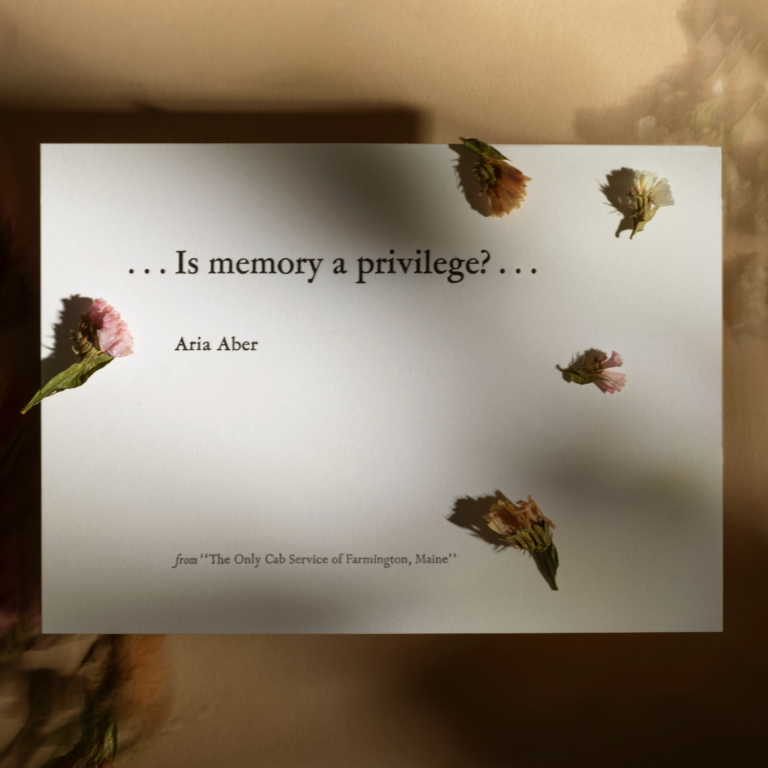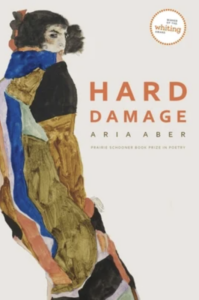Aria Aber
The Only Cab Service of Farmington, Maine
In a taxi, a poet speaks to the driver. It’s the only taxi in town. He mentions travel, mentions Afghanistan, that he was there with the forces. She’s from Afghanistan and the conversation continues — awkward; complicated; him trying to say good things, but failing; her feeling like she should rescue him, but deciding not to. War is upended by the point of view of a person in whose country the war was fought. Underneath the action of the poem is a question about whether conversation is possible, and an appreciation for silence.

Letterpress prints by Myrna Keliher | Photography by Lucero Torres
Guest

Aria Aber is based in Oakland, CA. Her poems are forthcoming or have appeared in The New Yorker, Poetry Magazine, Kenyon Review, The Poetry Review and elsewhere. She is the author of Hard Damage, which won the Prairie Schooner Book Prize in Poetry and a Whiting Award. She is currently a Stegner Fellow in Poetry at Stanford University.
Transcript
[music: “Praise the Rain” by Gautam Srikishan]
Pádraig Ó Tuama: My name is Pádraig Ó Tuama, and a number of years ago I was speaking at a conference for gay Catholics. It wasn’t in Ireland. And during one of the meals at this conference, a man sitting next to me said, “The thing that Irish people never get is that the British Empire wasn’t such a bad thing.” And I was aghast, and I didn’t know what to say to him. And I went, “You know where I’m from, don’t you? And also, what language should we have this conversation in?” And he said to me, “Is this going to be a helpful conversation?” [laughs] And I was like, “I don’t think it is.”
I think there was the imagination that because we had this common ground — both gay Catholics, at this conference — that somehow we’d find common ground about something to do with empire that was centuries old. And the answer was no, and so we kept a certain kind of courteous silence after that.
“The Only Cab Service of Farmington, Maine,” by Aria Aber:
“He makes me sit next to him, so I inquire—
as if remembering his own smallness
would prevent him from violating another’s—
about his childhood. Cape Cod, he recalls:
how lonely he felt among the blue expanse
each winter, longed to travel, so he joined
the Marines. And I did travel, he fools,
all the way to Afghanistan. When I tell him
that’s where I’m from, his laugh crumbles,
and I am sorry for a trembling in me
or in him, I can’t tell. Too chagrined to look
at his face, I observe krumholz, blurs
of frozen buds. Afghans are good people,
though, he disarms himself. And damn,
that food. But I loathe my Afghan blood,
especially here, amid snowy balsam firs
and cookie-cutter houses. They saved,
you know, his words butter me, my life—
gave me bread, warmth. They didn’t
have to. Bad things happened. Awful
things. Nothing is calmer today: Kabul
still mourns contaminated water,
and another suicide bomber. I shouldn’t
tell you this, but, he coughs—I miss
it sometimes. The provinces were so hot—
it was like another planet. I will never
feel at ease here, between subalpine hills, gas
stations advertising Nescafe and Dove.
But after eight years on the base, his voice
clear as a fist, you wake up, hating
the person in the mirror. Now my life
is about forgetting. Is memory a privilege?
I couldn’t, after I arrived in the States,
remember a single damn village. Is it a sin,
then, to be envious that my driver
had a home in my home—yellow dust on long,
mountainous roads, where twenty-two civilians
died in the fourth attack this month—for longer
than I ever did? He has, I feel, estranged me.
You know, I hear his heavy, American voice
crack like a creek thawing under a deer, it’s good
to be back. The unspeakable opens between us
its waters, cold, full of shame, until we drift apart
again, never asking for each other’s names.”
[music: “First Grief, First Air” by Gautam Srikishan]
This is a poem, really, that’s an exploration of place and all of the emotion and pain and beauty that can be gathered into memory of place. So, first of all, there’s the car, the cab service, and it’s the only cab service in Farmington, Maine. And then, inside the car, the poet sits next to the driver — he makes her, it says.
And then he recalls Cape Cod and Afghanistan. And then, once again, we’re back in the car, but Aria Aber, the poet, is looking out of the window to the krummholz, stunted vegetation, as well as the frozen buds. And then the place changes again — we’re back to Afghanistan, and specifically, Kabul, and then back to here, subalpine hills and gas stations. And then you’re back to a Marine base, and then we’re back in the situation where Aria Aber has arrived in the States, and then, again, back to Afghanistan — “yellow dust on long, / mountainous roads” — and finally, then, back into this cab, where there’s silence between the two of them.
So place is moving all the time within the context of this, and the cabdriver is able to remember place with relative ease of going back and forth. He’s openhearted, and at the same time, he has the privilege of being able to hold memories of Afghanistan in a way that Aria Aber is not able to. She was born in Germany, and her parents are Afghan, and they had fled Afghanistan and sought asylum in Germany. And so she’s Afghan in Germany. And at 18, she came to the United States for school and has stayed. And so she grew up trilingually — she grew up with her parents’ language and her own language, Dari, and also German, of course, and English, too. She writes her poetry in English.
You know, in selecting poems for this season, I’d selected this one months before everything that happened in the summer of 2021 with the withdrawal of forces from Afghanistan. In a certain sense the name, “Afghanistan,” has become a byword for other countries’ foreign policies. And this, I think, is one of the other ways within which silence and exile and displacement and estrangement has come about. And it’s represented so powerfully in this poem, because Aria Aber is speaking about a person who’s speaking about Afghanistan. And she, as someone from there, is feeling estranged by the ways foreigners are speaking about a place that she’s from but hasn’t been able to grow up in.
[music: “Great is the Contessa” by Blue Dot Sessions]
This is a narrative poem. It’s a story, and it’s filled with conversation. It’s filled with the everyday: people trying to create conversation; awkwardnesses; ways of trying to have some courtesy towards a stranger. And often, I suppose, you might imagine that a poem about a conversation with a stranger would lead to a deep sense of connection over something of common ground with that stranger. But there is common ground here, complicated and unusual uncommon ground. And as a result, this poem lapses into silence by the end.
And that’s what I think is so interesting, in a poem that’s filled with back-and-forth of conversation — the way he makes her get in the front of the cab, she’s alert about that; and she’s asking about his childhood; and then talk of travel and Afghanistan; and even the casual direct speech of the way he says, “And damn, / that food.” He has an assuredness and an openheartedness in him, and he knows where he’s from
But it’s not just him that’s being judged here. It’s the question of foreign Marines’ presence in Afghanistan. And as a result, she feels estranged — estranged from her own story, estranged, perhaps, even from the possibility of going to a place that she hasn’t spent much time in.
“Estranged” is a really interesting word, meaning treat as a stranger, or alienate, or to make something unfriendly. And what’s been made unfriendly? The cab, the conversation, the way within which, in order for the two of them to keep on talking, there’s so much pain, which isn’t just hers; it’s the pain of all the people whose lives have been lost, all the ways within which bombers and “the fourth attack this month” are all present and being carried in her, in her language, in the story of her family, in the story of her place, in the whole way that she grew up
All of that is present in the car with them. And of course, estrangement happens. What we’re hearing, really, is the question of war. And is it the war or him who should be judged? And I suppose, deeper than that, there’s the question as to who is able to separate war and people. And if you can, it’s probably a certain kind of privilege, to separate war and people
So no wonder the unspeakable opens up between them at the end, because what are you going to do? She’s looking for a cab service in Farmington, Maine, and it’s the only cab service. She clearly needs to go somewhere. And is this a safe place to talk? Is this a trustable place to talk? Is this a place where, if she put her point of view across, it would work, where it could be received? No, I think is the answer. So this is a poem about conversation and about how you reach the edge of conversation, and how what one person says might take the words from another person’s mouth or the ground from underneath them, and that possibly the only accessible response is silence.
[music: “Scallat” by Blue Dot Sessions]
There’s two really interesting similes that Aria Aber uses. The first is: “But after eight years on the base, his voice / clear as a fist.” And then the second one is: “I hear his heavy, American voice // crack like a creek thawing under a deer.” Both of these similes are to do with his voice, and so, clearly, there’s something about his voice that she is reflecting on, thinking through. And one of them, “clear as a fist,” is such a simple simile that she’s using to say one thing’s like another. But a fist — you know, a fist is often associated with the question of defense or violence.
And then she speaks about his “heavy, American voice // crack like a creek thawing under a deer.” Is it because he is carrying the wounds of war in him? Is it because, even though he’s mostly trying to forget, he’s actually mostly remembering? Is it because there’s a burden that he’s carrying, like a creek thawing under a deer? Who is going to suffer, in the context of this?
It does sound like Aria Aber is making space in this poem for recognizing the way within which his voice, on the one hand, is a voice of authority, and on the other hand, is a voice of great vulnerability. And she’s seeing in him, these two-handed experiences are represented in his own person and in the way that he’s talking in this cab in Farmington, in Maine. And for her the question is, I suppose, how is she going to feel safe in response to that, just in the cab, but on a broader level, as an Afghan?
[music: “Toothless Slope” by Gautam Srikishan]
This poem has a real mixture of beauty and brutality. And that’s an extraordinary brilliance that Aria Aber brings to the poem. So there’s the memory of food and connection and hospitality and bread, and even that description, “yellow dust on long, // mountainous roads,” that sounds like a memory of a place that holds journey home, maybe, or holds a certain kind of nostalgia. But that line then goes on to say, “where twenty-two civilians / died in the fourth attack this month.” She insists on putting the two together, which isn’t about letting anybody off the hook, but it is about finding a way wherein beauty and brutality need to be the complicated associations that are held together when speaking about Afghanistan.
She goes back and forth between a place that both of them have powerful connections to. And there they are, in a car in that part of the U.S.A., and there’s “snowy balsam firs / and cookie-cutter houses” and “subalpine hills” and fields with frozen buds. That’s beautiful, too. And there’s a way within which she is bringing a disturbing sense of place into that place of beauty, because she’s saying she’s finding it hard to belong there. And somehow, through war and through exile and through people traveling for study or traveling through the Marines, people are brought together alongside each other.
The poem is so wise about saying how difficult it is to talk. And yet I think there is an invitation in this to consider, what might it mean to talk about the complicities that our countries and our wars have forced us into?
[music: “What Did You Not Hear” by Gautam Srikishan]
“The Only Cab Service of Farmington, Maine” by Aria Aber:
“He makes me sit next to him, so I inquire—
as if remembering his own smallness
would prevent him from violating another’s—
about his childhood. Cape Cod, he recalls:
how lonely he felt among the blue expanse
each winter, longed to travel, so he joined
the Marines. And I did travel, he fools,
all the way to Afghanistan. When I tell him
that’s where I’m from, his laugh crumbles,
and I am sorry for a trembling in me
or in him, I can’t tell. Too chagrined to look
at his face, I observe krumholz, blurs
of frozen buds. Afghans are good people,
though, he disarms himself. And damn,
that food. But I loathe my Afghan blood,
especially here, amid snowy balsam firs
and cookie-cutter houses. They saved,
you know, his words butter me, my life—
gave me bread, warmth. They didn’t
have to. Bad things happened. Awful
things. Nothing is calmer today: Kabul
still mourns contaminated water,
and another suicide bomber. I shouldn’t
tell you this, but, he coughs—I miss
it sometimes. The provinces were so hot—
it was like another planet. I will never
feel at ease here, between subalpine hills, gas
stations advertising Nescafe and Dove.
But after eight years on the base, his voice
clear as a fist, you wake up, hating
the person in the mirror. Now my life
is about forgetting. Is memory a privilege?
I couldn’t, after I arrived in the States,
remember a single damn village. Is it a sin,
then, to be envious that my driver
had a home in my home—yellow dust on long,
mountainous roads, where twenty-two civilians
died in the fourth attack this month—for longer
than I ever did? He has, I feel, estranged me.
You know, I hear his heavy, American voice
crack like a creek thawing under a deer, it’s good
to be back. The unspeakable opens between us
its waters, cold, full of shame, until we drift apart
again, never asking for each other’s names.”
[music: “Praise the Rain” by Gautam Srikishan]
Chris Heagle: “The Only Cab Service of Farmington, Maine” comes from Aria Aber’s book, Hard Damage. Thank you to University of Nebraska Press, who gave us permission to use Aria’s poem. Read it on our website, at onbeing.org.
[music: “Praise the Rain” by Gautam Srikishan]
Poetry Unbound is: Gautam Srikishan, Erin Colasacco, Eddie Gonzalez, Lilian Vo, and me, Chris Heagle.
Our music is composed and provided by Gautam Srikishan and Blue Dot Sessions.
This podcast is produced by On Being Studios, which is located on Dakota land. We also produce other podcasts you might enjoy, like On Being with Krista Tippett, Becoming Wise, and This Movie Changed Me. Find those wherever you like to listen, or visit us at onbeing.org to find out more.
Books & Music
Recommended Reading
The On Being Project is an affiliate partner of Bookshop.org and Amazon.com. Any earnings we receive through these affiliate partnerships go into directly supporting The On Being Project.







